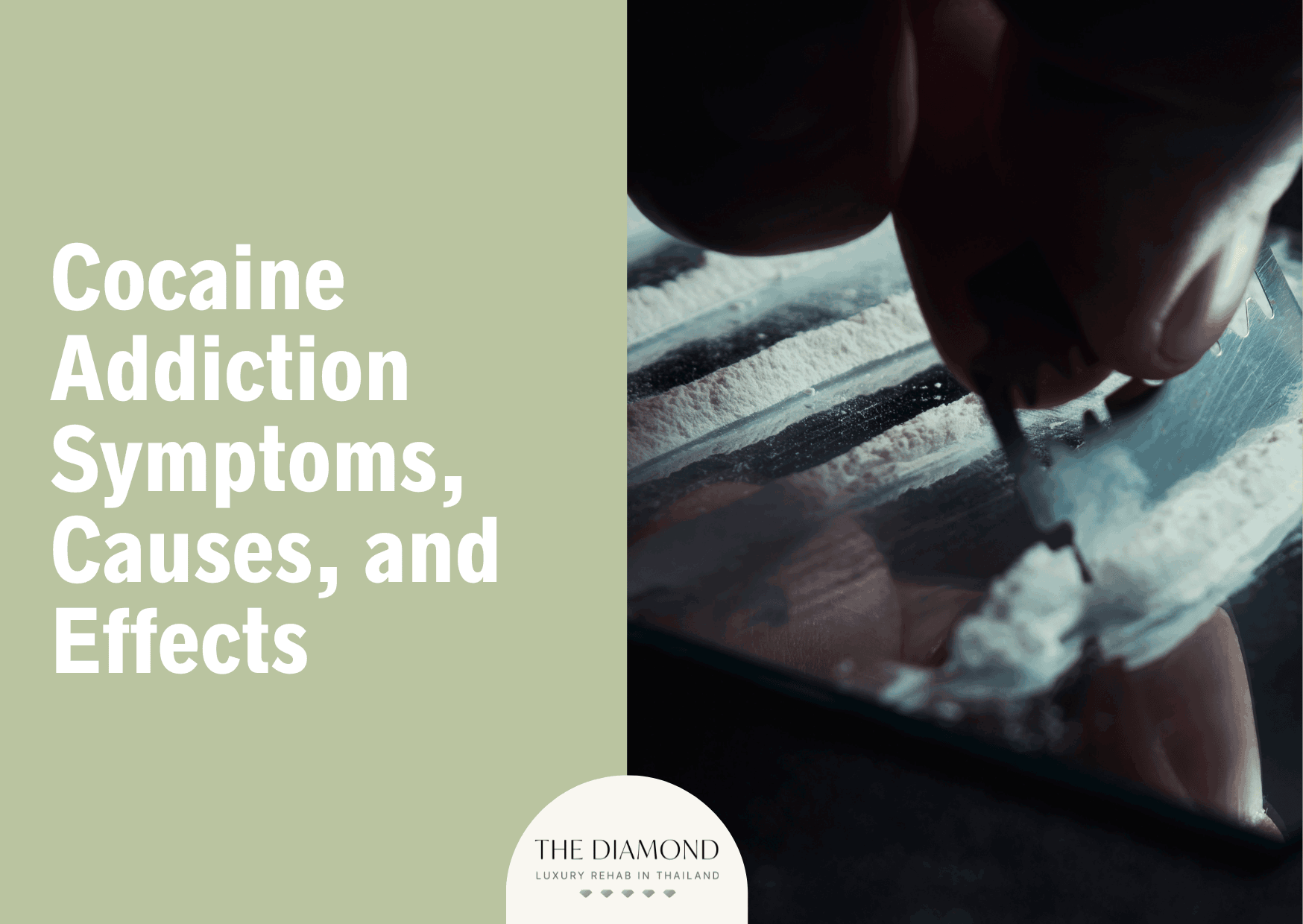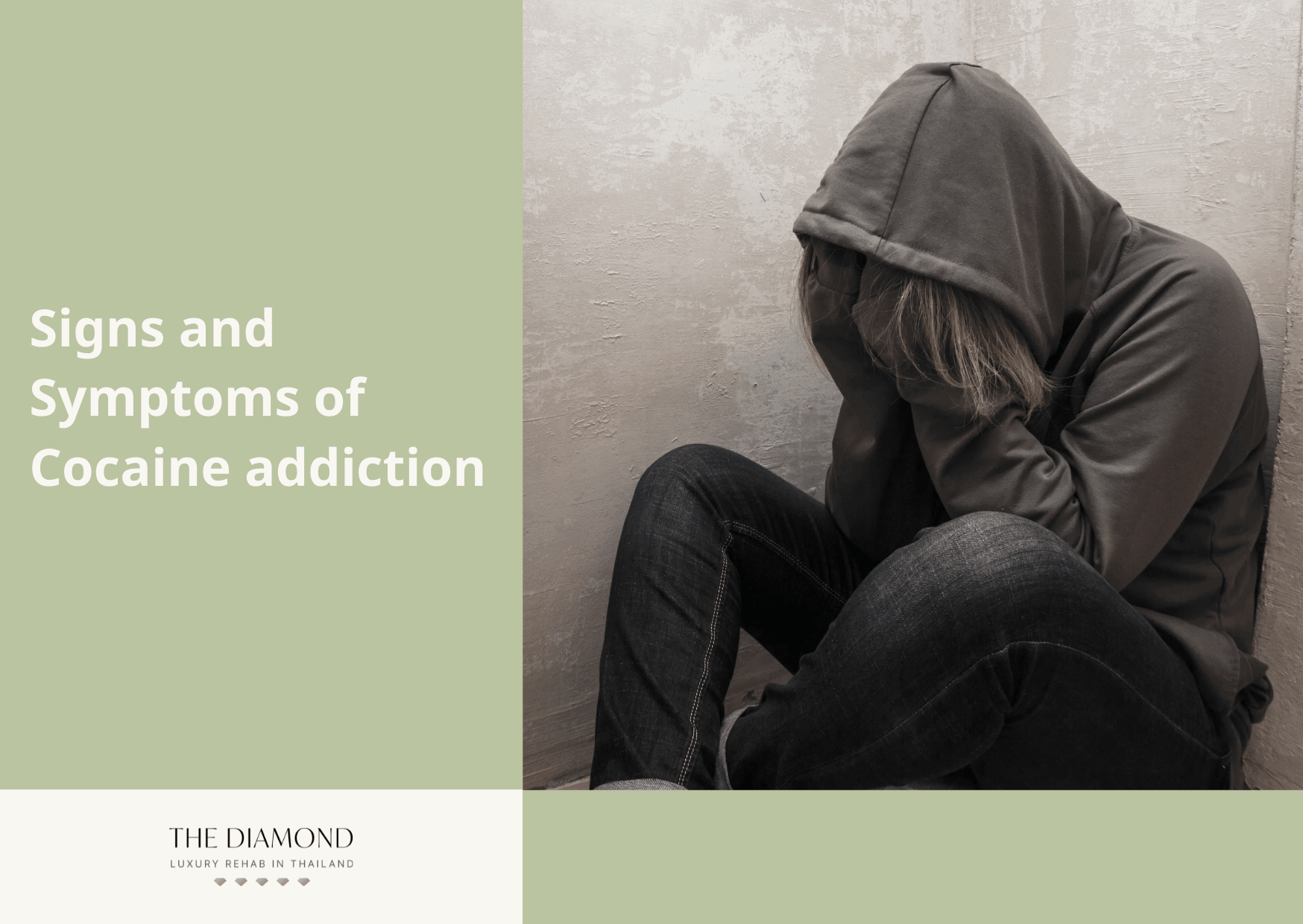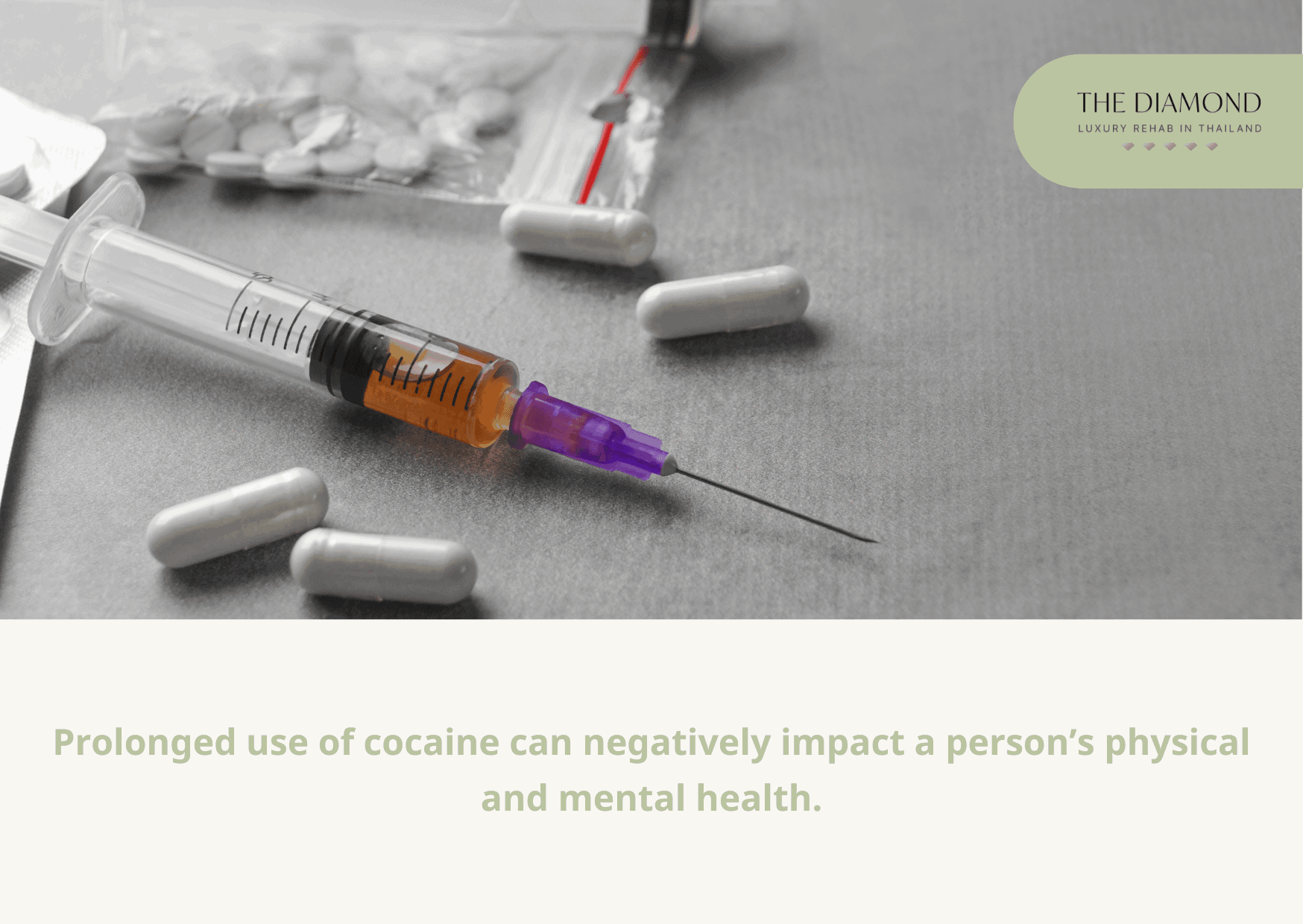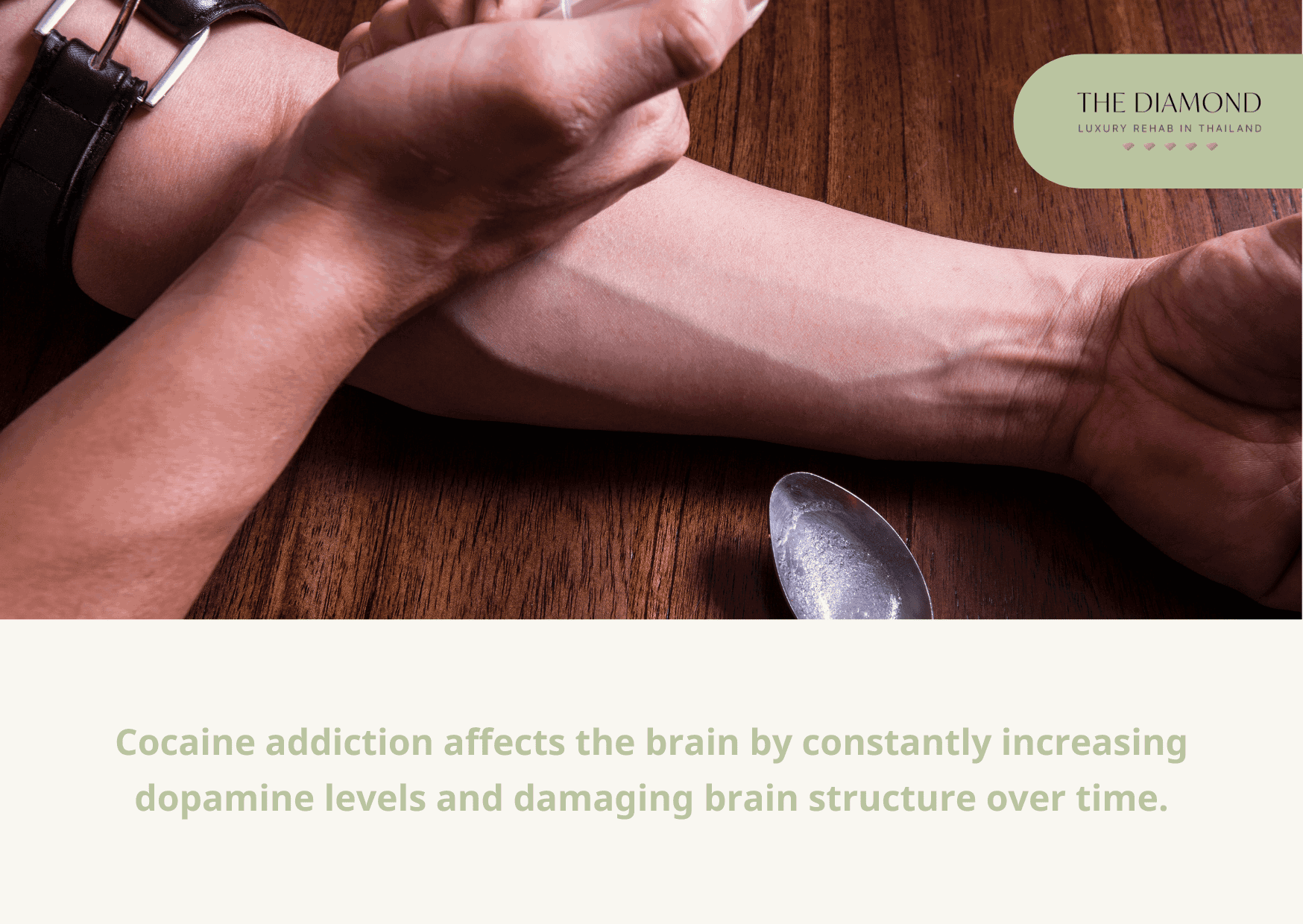Cocaine addiction symptoms, causes, and effects
Table of content
- What is cocaine addiction?
- What are the causes of cocaine addiction?
- What are the effects of cocaine addiction?
- What are the signs and symptoms of cocaine addiction?
- How to overcome cocaine addiction
- What are the risk factors for cocaine addiction?
- How do you treat cocaine addiction?
- What are the statistics about cocaine addiction?
- How does cocaine addiction affect the brain?
- How long does cocaine stay in your system?
- How to treat cocaine overdose?

Cocaine addiction is a disorder in which a person persistently uses cocaine despite serious consequences. Regular cocaine use produces euphoria and increased amounts of energy.
Signs that are indicative of cocaine addiction can be physical, psychological, or social. The most common symptoms of cocaine addiction include frequent nosebleeds, hyperactivity, paranoia, tolerance accompanied by withdrawal, and isolation from family and friends.
Addiction to cocaine has multiple causes and certain biological, psychological, and social factors can all play a role in the development of the disorder. The causes of cocaine addiction are genetics, neurotransmitter imbalances, co-occurring mental health disorders, and social pressure.
The effects of cocaine addiction include decreased appetite, intense euphoria, irritability, increased heart rate, heart attack, and lung damage.
What is cocaine addiction?
Cocaine addiction is a chronic disorder characterized by compulsive use of cocaine despite serious risks and consequences. Cocaine is an illicit drug that has a high potential for abuse.
A cocaine addict will continue using the drug even though there are obvious harmful effects. Cocaine addiction often involves physical and mental dependence. Becoming dependent on the substance means that a person may experience symptoms of withdrawal when cutting back on cocaine use.
What are the causes of cocaine addiction?
Causes of cocaine addiction involve several contributing factors. The most common causes of cocaine addiction are listed below.
- Biological factors: The biological factors that influence cocaine addiction include genetics, cocaine’s effects on the reward system of the brain, and neurotransmitter imbalances, according to a 2013 article by Marc Potenza, MD, PhD, published in the Journal of Adolescent Health. An individual who has a family history of addiction to cocaine or other drugs is more likely to abuse cocaine. Repeated use of cocaine can also alter the brain reward system by stimulating excessive amounts of dopamine, a neurotransmitter associated with pleasure and decision-making. For some people, cocaine abuse may be due to an attempt to deal with an inborn neurotransmitter deficiency. Deficiency in certain brain chemicals can cause shifts in behavior and mood, making other people turn to cocaine to achieve a pleasurable feeling.
- Psychological factors: Certain mental health conditions often occur alongside an addiction to any substance. Co-occurring psychological disorders such as depression and anxiety are more likely to be exacerbated by cocaine addiction.
- Social factors: Peer pressure can cause people to engage in risky behaviors, including cocaine abuse. Cocaine is one of the most commonly abused party drugs, according to a 2004 report on the social determinants of drug use from the National Drug and Alcohol Research Centre. People who use cocaine do so to intensify social experiences and reduce inhibitions in certain social situations.
What are the effects of cocaine addiction?
The effects of cocaine addiction impact the brain and the body in various ways. The effects of cocaine addiction are listed below.
- Adverse effects: Repeated exposure to cocaine has several adverse effects on a person’s health. One of the most serious health dangers of cocaine is the risk of a heart attack. Cocaine is a powerful stimulant drug that may be too much for one’s heart to handle. Cocaine puts stress on the heart and blood vessels, eventually causing a heart attack.
- Physical effects: consequences that can occur shortly or after prolonged cocaine use. The physical effects of cocaine addiction include alertness, increased libido, talkativeness, heightened sensitivity to light or sound, nausea, and chest pain.
- Psychological effects: Cocaine addiction can lead to a wide array of psychological changes. The psychological effects of regular cocaine use include increased irritability, anxiety, depression, paranoia, delusional thinking, and impaired judgment, according to a 1999 article on cocaine and its psychiatric symptoms published in the Primary Care Companion to the Journal of Clinical Psychiatry .
- Short-term effects: Cocaine can cause a short-lived high that is quickly followed by intense cravings for the drug. The common short-term effects of cocaine use are faster heartbeat, intense euphoria, decreased appetite, dilated pupils, and convulsions, to name a few.
- Long-term effects: The long-term effects of constant cocaine use include sleep deprivation, psychosis, sexual problems, malnutrition, mood disturbances, and loss of interest in other areas of life.
What are the signs and symptoms of cocaine addiction?

Symptoms of cocaine addiction can be physical, psychological, or social. The most common signs and symptoms of cocaine addiction are listed below.
- Excessive sweating: One physical symptom of cocaine addiction is elevated body temperature. In some cases, cocaine can also increase the body temperature to fatal levels. Aside from generating more heat, a 1993 article by Larry P. Gonzalez published in NeuroReport suggests that cocaine may also interfere with the body’s ability to cool when exposed to extreme temperatures.
- Changes in sleeping patterns: The use of cocaine increases wakefulness and causes sleep disturbances. A person struggling with cocaine addiction may develop sleeping problems due to the spike of dopamine in the brain which causes alertness and wakefulness.
- Paranoia: one of the many psychiatric symptoms that is triggered by cocaine. Cocaine-induced paranoia can last for a few days or weeks. Paranoia can be due to the effects of cocaine or it can also be a pre-existing psychiatric disorder worsened by the substance.
- Risk-taking behaviors: Regular cocaine use can cause overconfidence in a person, resulting in high-risk behaviors. Cocaine addicts often engage in risky behaviors while under the influence of the substance. Some examples include trading sex for cocaine and having several sexual partners, which increases the risk for sexually transmitted diseases (STDs), according to a 1993 study by Fullilove et al., published in the Journal of Adolescent Health.
- Financial difficulties: A cocaine addict may spend large amounts of money to fuel the addiction. An individual may spend a lot of money looking for cocaine, which can be expensive as the addiction intensifies over time. The financial effect of regular cocaine use can also be in the form of neglecting responsibilities, including going to work and paying bills.
- Negative impact on personal relationships: Prolonged cocaine use can have a negative impact on relationships with family or friends. A cocaine addict may isolate themselves from loved ones or completely disregard family members to prioritize cocaine consumption.
- Tolerance and withdrawal: One of the defining features of any substance addiction is tolerance, or needing to use the drug more frequently to achieve the same high. Tolerance is often accompanied by withdrawal. Once tolerance to cocaine develops, withdrawal symptoms such as intense cravings, chills, and fever may occur when a person attempts to cut down on cocaine use.
Other possible cocaine addiction symptoms include:
- Increased irritability
- Extreme energy
- Mood swings
- Pupil dilation
- Loss of interest in other activities
- An inability to cut down on cocaine use
Is cocaine addiction good or bad?
Cocaine addiction is bad for an individual’s physical and mental health. According to statistics on drug abuse from the National Center for Drug Abuse Statistics, in 2018 alone, 5.5 million people in the United States have reported cocaine use in the past year. Furthermore, cocaine, alongside other club drugs such as ecstasy and LSD, is mainly used in higher-income settings by younger people.
But while younger people are more likely to use substances, the rate of cocaine use among people over 40 is 37%. Cocaine addiction is also more prevalent in males than in females, with 2.6% of males admitting to having used cocaine and 1.5% of females who have engaged in addictive behaviors around the drug.
Cocaine addiction has a plethora of health dangers. The negative effects of long-term cocaine use can manifest in physical and mental ways, including cognitive impairment, weight loss and eating disorders, sexual dysfunction, psychosis, violent behavior, and social withdrawal, to name a few.
The positive effects of cocaine center on the drug’s medical uses. Cocaine is an effective local anesthetic used in medical procedures as the drug has numbing properties. In some cases, cocaine can also be used in treating minor lacerations as the drug causes vasoconstriction or narrowing of blood vessels, according to a statement on the medical use of cocaine form the American Academy of Otolaryngology-Head and Neck Surgery.
What are some of the warning signs of cocaine addiction?
The warning signs of cocaine addiction should be recognized for early intervention and treatment. The warning signs of cocaine addiction are listed below.
- Pupil dilation: Stimulants like cocaine can cause pupil dilation. Cocaine can trigger the release of brain chemicals as well as endorphins and adrenaline. As a result, the body responds by making the pupils appear larger than normal.
- Frequent runny nose or sniffles: occurs in some people who snort cocaine. Snorting cocaine can irritate and damage the lining inside the nose. This is why nosebleeds are common in people after snorting drugs.
- White residue around nostrils: Cocaine is a powdery white substance made from the leaves of the coca plant. Seeing white residue on a person’s nostrils or belongings may suggest that the individual is using cocaine.
- Tremors and muscle twitches: The damage that cocaine inflicts to certain areas of the brain can lead to issues with movement, including fast movements, shaking, and twitching.
- Unexplained weight loss: People who use cocaine often experience loss of appetite and increased energy. Being awake and active and having a suppressed appetite while under the influence of cocaine may explain the unhealthy weight loss in cocaine addicts.
How to overcome cocaine addiction
To overcome cocaine addiction, one must first recognize that they have a problem with cocaine use and choose to do something about it. Taking a look at a person’s cocaine use may be a stepping stone to recovery.
However, at times, a cocaine addict may lack self-awareness and may fail to understand that there is a problem. In such cases, family members and loved ones play an essential role in convincing the struggling person that help is needed to recover from addiction.
Once help and support from loved ones have been established, it is easier to take steps in improving an individual’s situation. With the right assistance, a cocaine addict may start looking for facilities that offer specific treatment options depending on one’s needs and the severity of the disorder.
Joining self-help groups that focus on emotional support may also be beneficial for people struggling with cocaine addiction.
What are the risk factors for cocaine addiction?
The risk factors for cocaine addiction are different influences that can increase an individual’s vulnerability to the drug. The risk factors for cocaine addiction are listed below.
- Family history of cocaine addiction: Heredity is a risk factor that is closely associated with addiction. Having an immediate family member with cocaine addiction may put someone at an increased risk of developing the disorder.
- Pre-existing mental health disorder: Mental health conditions such as depression and anxiety often occur alongside cocaine addiction. Cocaine can also cause and worsen certain psychological disorders. One may regularly use cocaine as a means of coping with negative feelings.
- Use of cocaine at an early age: Taking drugs at an early age can negatively impact the developmental processes in the brain. This increases the likelihood of an individual continuing cocaine use and eventually becoming addicted in the future.
- Lack of parental supervision: Being in a dysfunctional family where there is a lack of parental involvement can make younger people turn to risky behaviors by experimenting with drugs.
- The object of addiction: A person’s preferred drug plays a significant role in how quickly the addiction progresses. Certain drugs such as cocaine, methamphetamine, and opioids can reach the brain more quickly, resulting in a faster progression of addiction.
How do you treat cocaine addiction?

Cocaine addiction is treated by addressing the unique underlying cause of the disorder for each individual with the help of inpatient programs, support groups, medications, or cognitive-behavioral therapy (CBT).
Inpatient programs allow individuals to enter residential treatment centers, away from potential triggers that may tempt people to use cocaine. Inpatient treatment also offers a safe and supportive environment for a recovering user.
Support groups are also beneficial in treating cocaine addiction. Taking part in support groups may be done during residential treatment or after a patient leaves therapy. Peer support groups such as Cocaine Anonymous and Narcotics Anonymous offer the support of recovering addicts with other people who share the same struggle and experiences.
There is no FDA-approved medication intended to treat cocaine addiction. However, medication treatments involving the use of antidepressants or stimulants may aid in suppressing cravings and offering relief for withdrawal symptoms.
Cognitive-behavioral therapy (CBT) is a form of behavior treatment commonly used in treating people struggling with addictions. CBT helps cocaine addicts recognize harmful thought patterns and behaviors that can potentially cause a relapse and healthily avoid such situations.
Why is using cocaine addictive?
Using cocaine is addictive because the substance significantly affects the brain by preventing dopamine from being reabsorbed, resulting in euphoric feelings. Cocaine is a white powdery substance that is derived from the South American coca plant. A powerful stimulant drug, cocaine has a huge potential for abuse.
The substance is known for its medical and herbal uses. Cocaine is a popular anesthetic legally used in medical procedures involving the ear, nose, and throat, according to a 1989 review of the history, actions, and legitimate uses of cocaine published in the Journal of Substance Abuse Treatment. The drug can cause vasoconstriction or narrowing of blood vessels, which helps reduce bleeding.
In certain countries like Peru and Bolivia, coca leaves are made into an herbal tea called coca tea. The tea is commonly recommended for travelers in certain nations to prevent altitude sickness.
The advantages of cocaine mainly involve the drug’s medical benefits, including the local anesthetic properties of cocaine that allow certain surgeries to be done without pain. However, the medical use of cocaine also comes with major disadvantages as the substance has cardiotoxic effects and can cause an increased risk of developing glaucoma.
Another obvious disadvantage of cocaine has something to do with its highly addictive potential. Prolonged use of cocaine can negatively impact a person’s physical and mental health. Cocaine addiction can also cause damage to one’s personal relationships and finances.
Cocaine use can be addictive because the drug produces abnormally high levels of dopamine, a chemical in the brain associated with reward and motivation. Regular cocaine use can cause a brief yet intense high which encourages repeated use of the substance.
When is cocaine addiction counseling necessary?
Cocaine addiction counseling is necessary when addressing the psychological aspect of a person’s addiction. Through counseling, therapists gain an understanding of what triggers an individual’s cocaine use and develop coping strategies that may help patients avoid giving in to such stressors.
Counseling can be done individually, in groups, or with family members. Sessions with a therapist or counselor are vital in identifying the root cause of an individual’s cocaine dependence and providing solutions to maintain sobriety.
What are the symptoms of cocaine addiction withdrawal?
The symptoms of cocaine addiction withdrawal can manifest in physical and psychological ways, including but not limited to fatigue, irritability, fever, muscle aches, overwhelming cravings, anxiety, paranoia, and depression.
Cutting down on cocaine use can cause extreme discomfort to an individual. Cravings are commonly intense and can result in strong urges to use cocaine again.
What other drugs aside from cocaine can cause addiction?
Aside from cocaine, several drugs can cause addiction, including methamphetamine, marijuana, hallucinogens like LSD, inhalants like aerosol sprays and solvents, and opioid painkillers such as oxycodone and heroin.
The addictive potential of cocaine and other drugs mentioned may differ from each other, but all commonly misused drugs activate the reward center of the brain. This mechanism of action makes such substances habit-forming.
What are the statistics about cocaine addiction?
Recent statistics about cocaine addiction show overdose death rates involving cocaine and the age group that is most likely to use the substance.
Drug overdose fatalities due to cocaine saw an increase by nearly 9% from 2018 to 2019. In fact, drug overdose death rates from the National Center for Health Statistics indicate that in 2019, 15,883 Americans died from a drug overdose involving cocaine. Results from the 2018 National Survey on Drug Use and Health also reported that around 760,000 adults aged 26 or older suffered from a cocaine use disorder in the past 12 months. This makes them the age group with the highest percentage of people who reported recent cocaine use.
Finally, a 2011 study by Hoseinifar et al., published in the journal Procedia – Social and Behavioral Sciences suggests that the quality of life among addicts was lower in terms of physical and mental aspects, including bodily pain, impaired social functioning, anxiety, depression, and inappropriate quality of life. Such physical and mental consequences affect a cocaine addict’s self-esteem, career, and social relationships, ultimately leading to a decline in the quality of life.
How does cocaine addiction affect the brain?

Cocaine addiction affects the brain by constantly increasing dopamine levels and damaging brain structure over time. Dopamine is a naturally occurring chemical in the brain. In normal amounts, dopamine travels from one brain cell to another to convey feelings of pleasure and reward.
Regular cocaine use leads to overly high dopamine levels that can interfere with the communication between brain cells. Over time, cocaine addiction causes the brain to adapt to excessive levels of dopamine, making the addictive behavior less pleasurable. As a result, an addict develops tolerance to cocaine and will need more of the substance to achieve the desired effects of a dopamine high.
Long-term use of cocaine causes excess dopamine to flood the brain and damages its structure over time. This may explain why cocaine addicts experience seizures and other neurological complications.
How long does cocaine stay in your system?
Cocaine can stay in the body anywhere between a few days, weeks, and even months, depending on the frequency of use and other contributing factors. There are different tests done to identify cocaine usage and each varies when it comes to detection time.
Cocaine can be detected in the blood for 12 hours following last use, in the saliva and sweat for up to 2 days, in the urine for up to 3 days, and in a hair sample for multiple months.
Other influencing factors such as age, gender, frequency of use, and overall health can affect how long cocaine will stay in someone’s body.
What are the ways to use cocaine?
There are several ways to use cocaine, and each method of use can have different effects on the user. The main ways of using cocaine are listed below.
- Snorting
- Rubbing
- Injecting
- Smoking
How to treat cocaine overdose?
Cocaine overdose can be treated with emergency medical attention. An overdose is an emergency that requires prompt medical treatment to prevent long-term health problems or death.
Physical signs of a cocaine overdose include difficulty breathing, severe chest pain, repeated convulsions, seizures, extreme agitation, and nausea or vomiting. An overdose may happen when combining cocaine with other substances of abuse.
The mental signs of a cocaine overdose include extreme agitation or anxiety, panic attacks, paranoia, delirium, and hallucinations. Finally, cocaine overdose can have severe and potentially life-threatening effects on the body, including cardiovascular effects, such as elevated heart rate, high blood pressure, and an increased risk of heart attack or stroke.
Overdosing on cocaine can also result in excessive stimulation of the central nervous system, leading to seizures, severe agitation and anxiety, confusion, hallucinations, and tremors or muscle twitches.

